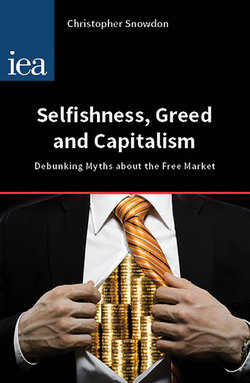Читать книгу Selfishness, Greed and Capitalism - Christopher Snowdon - Страница 15
На сайте Литреса книга снята с продажи.
Rational choice and behavioural economics
ОглавлениеA fair degree of rationality can be expected from human beings. As P. J. O’Rourke says, it would be most peculiar if we consistently acted irrationally: ‘Imagine a world where we went about our daily activities deliberately intending not to profit by them – eating pebbles, wooing the furniture, getting into our car for the sole purpose of driving into a tree’ (O’Rourke 2007: 50–51). Predictions based on logical utility maximisation can be tested empirically. Suzanne Moore may be right when she says that economics is not science, but it is a social science. It studies human activity, and therefore can never predict behaviour with the precision with which we associate the natural sciences. Nevertheless, we can observe behaviour and make reasonable predictions about what most people would do in routine situations based on their rational self-interest.
In mainstream economics, rationality ‘simply means that people behave in ways consistent with their preferences’ (Parkin et al. 2013). Behaving rationally means ‘choosing the best means to the chooser’s ends’ (Posner 1998). The task of economists would be so much easier if the world was populated with clear-headed, far-sighted, logical utility maximisers. Alas, it is not and few, if any, mainstream economists endorse a dogmatic version of rational choice theory in which people are assumed to be cold, calculating machines. Far from having a simplistic view of humanity, economists have relentlessly challenged and undermined the notion of ‘rational man’ for decades (Simon 1955; Sen 1977). Such concepts as ‘bounded rationality’, ‘rational ignorance’ and ‘rational irrationality’ have emerged from within the profession, with economists such as Richard Thaler, Vernon Smith, Ariel Rubinstein, Cass Sunstein, Ronald Coase and Bryan Caplan being among the contributors, assisted by a few psychologists, notably Daniel Kahneman and Dan Ariely. The whole field of behavioural economics has been testing the limits of rational behaviour for years while producing best-selling books and Nobel laureates. This is not some obscure sect challenging the conventional wisdom of rational man.
Behavioural economists have shown that many decisions are swayed by unconscious and irrational biases which result in people falling short of their goal of maximising their utility. Moreover, they have shown that – for some people, at least – these biases are systematic and predictable. We are, they say, predictably irrational (Ariely 2009). We are prone to irrational biases such as the gambler’s fallacy7 and the lightning-never-strikes-twice fallacy. We suffer from loss aversion8 and are susceptible to the madness of crowds. We allow ourselves to be influenced by others, especially when they tell us what we want to hear (confirmation bias). We are liable to expect current trends to continue and to forget previous losses (the new paradigm fallacy). We tend to put an exaggerated value on the present compared with the future (hyperbolic discounting) and even those of us who reject superstition are liable to chase financial losses, or be caught up in market bubbles, or act impulsively due to anger, love or pity. It can be argued that much ‘irrational’ behaviour is actually due to a lack of information rather than a deficit of logic – people tend to over-estimate the odds of being murdered or dying in a plane crash, for example (Posner 1998: 1573) – but there are enough examples of self-defeating irrationality to make us doubt rational choice theory in its most rigid form.
These are all interesting and potentially useful observations, but mainstream economists have never claimed that people are infallible. Supporters of rational choice theory, such as Gary Becker and Richard Posner, do not believe that models which assume a large degree of rationality are threatened by insights from behavioural economics, many of which have been incorporated into their work (Herfeld 2012). ‘The rational-choice economist asks what “rational man” would do in a given situation,’ writes Posner, ‘and usually the answer is pretty clear and it can be confirmed. Sometimes it is not confirmed – and so we have behavioural economics’ (Posner 1998: 1559). In the absence of a more compelling theory, they say, a model which assumes that people try to choose the best means to achieve their ends has greater predictive and explanatory power than any other – it is good enough to be useful. But they also note that economists ‘long ago abandoned the model of hyperrational, emotionless, unsocial, supremely egoistic, nonstrategic man (or woman)’ (ibid.: 1552). Like his close relative, the selfish capitalist, rational man is made of straw.
7 The belief that the outcome of a random event, such as a coin toss, is affected by previous outcomes of the same event.
8 Preferring to avoid a loss rather than make a gain.
